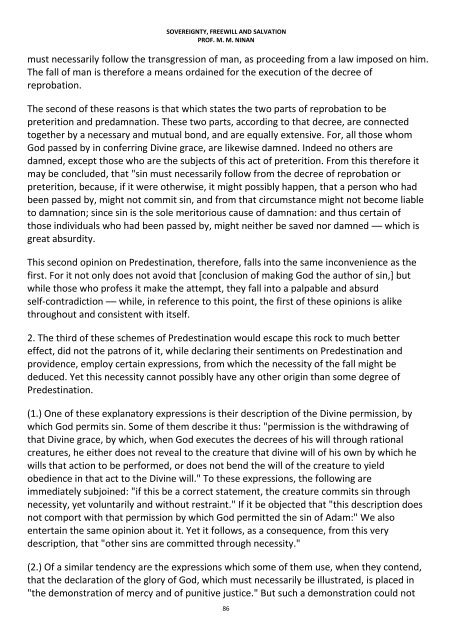Calvinism and Arminianism
You also want an ePaper? Increase the reach of your titles
YUMPU automatically turns print PDFs into web optimized ePapers that Google loves.
SOVEREIGNTY, FREEWILL AND SALVATION<br />
PROF. M. M. NINAN<br />
must necessarily follow the transgression of man, as proceeding from a law imposed on him.<br />
The fall of man is therefore a means ordained for the execution of the decree of<br />
reprobation.<br />
The second of these reasons is that which states the two parts of reprobation to be<br />
preterition <strong>and</strong> predamnation. These two parts, according to that decree, are connected<br />
together by a necessary <strong>and</strong> mutual bond, <strong>and</strong> are equally extensive. For, all those whom<br />
God passed by in conferring Divine grace, are likewise damned. Indeed no others are<br />
damned, except those who are the subjects of this act of preterition. From this therefore it<br />
may be concluded, that "sin must necessarily follow from the decree of reprobation or<br />
preterition, because, if it were otherwise, it might possibly happen, that a person who had<br />
been passed by, might not commit sin, <strong>and</strong> from that circumstance might not become liable<br />
to damnation; since sin is the sole meritorious cause of damnation: <strong>and</strong> thus certain of<br />
those individuals who had been passed by, might neither be saved nor damned — which is<br />
great absurdity.<br />
This second opinion on Predestination, therefore, falls into the same inconvenience as the<br />
first. For it not only does not avoid that [conclusion of making God the author of sin,] but<br />
while those who profess it make the attempt, they fall into a palpable <strong>and</strong> absurd<br />
self-contradiction — while, in reference to this point, the first of these opinions is alike<br />
throughout <strong>and</strong> consistent with itself.<br />
2. The third of these schemes of Predestination would escape this rock to much better<br />
effect, did not the patrons of it, while declaring their sentiments on Predestination <strong>and</strong><br />
providence, employ certain expressions, from which the necessity of the fall might be<br />
deduced. Yet this necessity cannot possibly have any other origin than some degree of<br />
Predestination.<br />
(1.) One of these explanatory expressions is their description of the Divine permission, by<br />
which God permits sin. Some of them describe it thus: "permission is the withdrawing of<br />
that Divine grace, by which, when God executes the decrees of his will through rational<br />
creatures, he either does not reveal to the creature that divine will of his own by which he<br />
wills that action to be performed, or does not bend the will of the creature to yield<br />
obedience in that act to the Divine will." To these expressions, the following are<br />
immediately subjoined: "if this be a correct statement, the creature commits sin through<br />
necessity, yet voluntarily <strong>and</strong> without restraint." If it be objected that "this description does<br />
not comport with that permission by which God permitted the sin of Adam:" We also<br />
entertain the same opinion about it. Yet it follows, as a consequence, from this very<br />
description, that "other sins are committed through necessity."<br />
(2.) Of a similar tendency are the expressions which some of them use, when they contend,<br />
that the declaration of the glory of God, which must necessarily be illustrated, is placed in<br />
"the demonstration of mercy <strong>and</strong> of punitive justice." But such a demonstration could not<br />
86

















